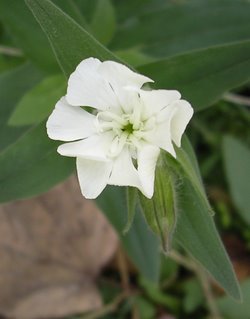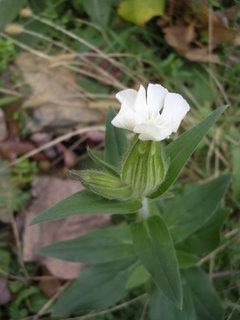A weed by name only


Yesterday morning on the dog walk I chanced upon this funny looking flower brightening the dreary and raw morning. It looks to be a weed but a bold one to bloom this late in the season. What could it hope would pollenate it now? It has a rather comical look, like it is wearing puffy pantaloons with a white collar sprouting where the waist should be. A gift.
Thanks to Annie in Austin the flower has been identified as probably: Silene latifolia and kindly supplied the following website.
http://en.wikipedia.org/wiki/Silene_latifolia
From wikipedia: "Silene latifolia, or White Campion, is a flowering plant in the family Caryophyllaceae, native to most of Europe, western Asia and north Africa. It is a herbaceous annual, occasionally biennial or a short-lived perennial plant, growing to between 40-80 cm tall."
"It is naturalised in North America, being found in most of the United States, the greatest concentrations of the plant can be found in the north-central and northeastern sections of the country."






5 Comments:
Your photo is prettier, but it looks sort of like this Silene,
http://en.wikipedia.org/wiki/Silene_latifolia.
Who knows why it's blooming in November!
Annie at the Transplantable Rose
Annie,
Thank you for the ID and link. It's pretty amazing that you knew what it was. I thought it was surely a weed. I checked it this morning and it was wilted by the frost but not completely dead. I agree it's pretty amazing that it's blooming in Nov.
I looked around the area and found one more plant with several smaller flowers in a waste area beside the road. So it apparently likes to bloom at this time of the year. At least here in NJ.
A nice surprise... I hadn't seen that one before.
Hi rurality, I've never seen one before either not that I can remember at least. But the old noggin is not what it used to be so it may be common here. I'll look around some more to see if more turn up. A nice surprise indeed. Thanks for writing.
The history of perfume goes back to Egypt, although it was prevalent in East Asia as well. Early perfumes were based on incense, not chemicals, so aromas were passed around through fumes. The Roman and Islamic cultures further refined the harvesting and manufacturing of perfumery processes to include other aromatic ingredients.
Thus, the ancient Islamic culture marked the history of modern perfumery with the introduction of spices and herbs. Fragrances and other exotic substances, such as Jasmine and Citruses, were adapted to be harvested in climates outside of their indigenous Asia.
Post a Comment
Subscribe to Post Comments [Atom]
<< Home